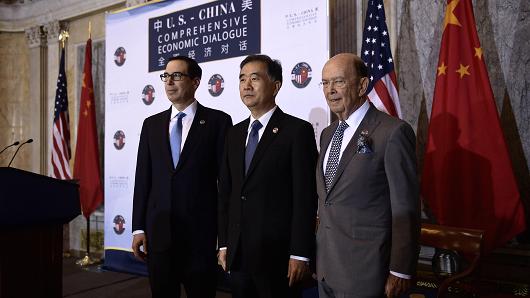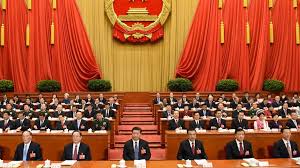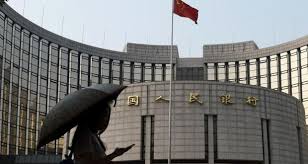
 A Steely Comprehensive Economic Dialogue
A Steely Comprehensive Economic DialogueOn July 19th, the first round of U.S.-China Comprehensive Economic Dialogue (CED) was held in Washington. The leaders of the dialogue were U.S. Treasury Secretary Steven Mnuchin, U.S. Commerce Secretary Wilbur Ross, and Chinese Vice Premier of the State Council, Wang Yang. Since the CED forum was launched in April, the two sides held more than 60 rounds of consultations as they worked on an initial 100-day plan to prepare for the meeting.
Anticipation for specific outcomes were high, especially for market access opportunities that could reduce the U.S. China trade imbalance. Earlier in the 100-day plan, China granted more access to U.S. beef exports. Bloomberg reported that following the talks, the U.S. can now ship rice to China. However, after the Chinese and U.S. sides cancelled the press conference to announce outcomes, many observers came to the conclusion that the talks fell short of expectations. Xinhua (link in Chinese) didn't explain any specifics outside of the two sides agreeing to continue meeting to discuss industries for further mutual investment, especially "high-tech" products.
What stalled the talks? Many credited the Trump administration's threat to use the trade "nuclear option," a threat to impose tariffs on steel imports to the U.S. in the name of national security, under a seldom used section of a 1962 trade act. According to The Financial Times, the fear was that this move "would open the door to retaliation from U.S. trading partners such as China, the EU, Japan, and South Korea and set off a trade war." Additional concerns were that it could lead to a spiraling series of counter reactions from countries invoking similar national security exceptions ind global trading rules, and thus "open a protectionist Pandora's Box that would undermine the current system built around the World Trade Organization."
International trade experts were dubious of the legality of invoking this law. NYU Law professor Robert Howse, told Axios: "Trump made a big mistake by identifying 'dumping' as his basis for imposing retaliatory tariffs on national security grounds." Not everyone agrees, though. A group of metal-based manufacturers and agriculture organizations in support of Trump's defensive trade stance wanted Ross to move ahead with strong action on steel and aluminum imports. A letter from the Coalition for Prosperous America said Ross should be undeterred by "vague speculation about trade retaliation."
The overall logic of invoking Section 232 is further brought into question when one considers that China doesn't even make it into the top ten of sources for U.S. steel.
 China's 19th Party Congress Speculation Heating Up
China's 19th Party Congress Speculation Heating UpPredictions and speculation in China are heating up in the final months before China's 19th Party Congress this fall. Many commentators have focused on a potential leadership shakeup, especially after the sudden dismissal of Chongqing's party chief and Politburo member, Sun Zhengcai last weekend. Sun was replaced by Guizhou's party chief, Chen Miner, who is, as the South China Morning Post reports, "a trusted protégé of President Xi Jinping." This is causing many to wonder what changes might occur during the 19th Party Congress to further solidify Xi Jinping's mandate.
In a commentary for China-US Focus, Jinghan Zeng of Royal Holloway University of London discusses how the informal age-limit rule might be amended to allow for senior politburo member Wang Qishan to stay for another term. This also would be an interesting development in regards to rumors that Xi may stick around for a third term. "By 2022, Xi will be 69 years old as well – the same age as Wang now. If Wang can set a new age limit precedent, why can't Xi?"
Beyond the discussion of personnel changes, the 19th Party Congress will reveal Xi Jinping's "theoretical contributions" to the Party. In another China-US Focus commentary, Pei Minxin describes how, "phrases such as 'Xi Jinping Thought' or even 'Xi Jinpingism' have appeared in the official press or speeches by high-ranking officials." He continues, "we should not be surprised when the 19th Congress officially endorses such lofty designations." Trivium has an excellent guide on what key themes to look for ahead of the 19th Party Congress.
According to an analysis by Qian Gang, director of the University of Hong Kong's China Media Project, Xi's name has been mentioned in People's Daily more than any other politician before him. Bloomberg mentions that the project's database stretches back to 1946. The South China Morning Post also reported that a new ten-part television series, "Carrying Reform through to the End," will begin airing next week ahead of the party congress, focusing on "the spirit of Xi's important speeches and his governing ideas." The attempts to portray Xi's image as a reformer appear to be in full effect.
 Key Finance Conference Embraces Real Economy and Warns of Financial Risks
Key Finance Conference Embraces Real Economy and Warns of Financial RisksChinese regulators and policymakers gathered in Beijing last Friday and Saturday for a key financial conference during which President Xi Jinping highlighted support for the "real economy" and again warned about financial risks. Among the major outcomes from this meeting, China's central bank will have more regulatory power in reducing financial risk. Also, a commission will be launched to oversee financial stability and development. The meeting is staged every five years to set the tone for China's financial policies and reform in coming years. Bloomberg listed five takeaways from the meeting, in particular that, "the meeting signaled that ongoing deleveraging in the financial sector could expand into the broader economy, with the debt of state-owned enterprises as the first priority."
In an interesting articles describing a People's Daily editorial, Sidney Leung keys in unique phrases that the CCP used at the conference to describe financial risk: the unpredictable "black swan" to the predictable "grey rhino." He writes: "The fact that the Chinese Communist Party policymakers are abandoning quotes from Karl Marx, Vladimir Lenin and Mao Zedong to adopt phrases from Western bestselling authors shows Beijing is trying to catch up or even lead market narratives."
In a related development, Bloomberg reported that China's outward direct investment fell by 46 percent in the first half of the year, due partly to tightened capital controls and partly to new restrictions on "irrational investments." Companies like Wanda and Anbang Insurance have been targets to these tightening capital controls.
 On This Day in Chinese History
On This Day in Chinese HistoryOn July 17th 1929, the Union of Soviet Socialists Republics (USSR) broke ties with the Republic of China. In a short bloody war which eventually became known as the Sino-Soviet Conflict, fighting initiative over the jointly operated Chinese Eastern Railroad (CER) in China's Northeast. For a decade, the Soviet government had promised to return the CER to Chinese control, but remained more than 67 percent ownership. In mid-July of 1929, Chinese authorities stormed the Soviet Consulate in Harbin, arresting the General Manager of the CER, his assistant and other Soviet citizens and removed them from power in the CER. The Soviets retaliated by arresting Chinese citizens inside the USSR. By July 19 they discontinued their diplomatic relations with the Chinese, suspended railways, and demanded that all Chinese diplomats leave Soviet territory.
Prepared by China-US Focus editorial teams in Hong Kong and New York, this weekly newsletter offers you snap shots of latest trends and developments emerging from China every week, while adding a dose of historical perspective.
- 2017-07-14 South China Sea Arbitral Award after One Year
- 2017-07-07 Now is the Trump Honeymoon with China Over?
- 2017-06-30 China Passes New Intelligence Law
- 2017-06-23 The End of China’s Honeymoon with Trump & Diplomatic and Security Dialogue
- 2017-06-16 Climate Change and Reliable Data Dealt Blows
- 2017-06-09 India, Pakistan formally welcomed into the Shanghai Cooperation Organization
- 2017-06-02 Once Partners in Fighting Climate Change, Trump Retreats, China Stays Steady on Paris Climate Accord
- 2017-05-26 Chinese Missile Frigates Confronts USS Dewey as U.S. Resumes FON Operations in South China Sea
- 2017-05-19 The Belt and Road Forum Concludes Leaving Behind Mixed Reactions
- 2017-05-12 Beijing, Washington Reach First Trade Deal Under 100-day Plan
- 2017-05-05 Degree of Autonomy Decaying in Hong Kong?
- 2017-04-28 Aircraft Carriers, Submarines, and Jetliners: Now Made in China
- 2017-04-21 Green Cards & Red Lines
- 2017-04-14 U.S Beef for Chinese Chicken? More Hollywood Films in China?
- 2017-04-07 The Xi-Trump Summit in Florida
- 2017-03-31 Google Makes a Comeback to China?
- 2017-03-24 Xi and Tillerson Trade Phrases
- 2017-03-17 Sec. Tillerson Visits Asia ahead of Xi-Trump Summit
- 2017-03-10 Defending China's Defense Budget
- 2017-03-03 The Korean Peninsula Draws Headlines